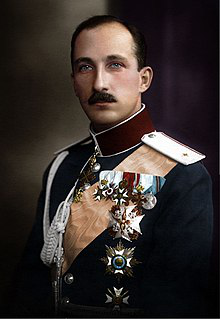

King of Bulgaria
30 January 1894 Sofia, Bulgaria
28 August 1943(1943-08-28) (49) Sofia, Bulgaria
NamesBoris Klemens Robert Maria Pius Ludwig Stanislaus Xaver
This article needs additional citations for verification. Please help improve this article by adding citations to reliable sources. Unsourced material may be challenged and removed. Find sources: "Boris III of Bulgaria" – news · newspapers · books · scholar · JSTOR (October 2017 ) (Learn how and when to remove this template message) King of Bulgaria Boris IIIBoris III of Bulgaria, a coloured photograph taken in Sofia in 1920'sKing of BulgariaReign3 October 1918 – 28 August 1943 PredecessorFerdinand ISuccessorSimeon IIBorn(1894-01-30 ) 30 January 1894 Sofia, BulgariaDied28 August 1943(1943-08-28) (aged 49) Sofia, BulgariaBurialRila MonasterySpousePrincess Giovanna of ItalyIssueMarie Louise, Princess of Koháry Simeon II of BulgariaHouseSaxe-Coburg and Gotha-KoháryFatherFerdinand I of BulgariaMotherPrincess Marie Louise of Bourbon-ParmaReligionEastern Orthodox prev. Roman CatholicSignature Boris III (Bulgarian: Борѝс III ; 30 January 1894 – 28 August 1943), originally Boris Klemens Robert Maria Pius Ludwig Stanislaus Xaver (Boris Clement Robert Mary Pius Louis Stanislaus Xavier), was the Tsar of the Kingdom of Bulgaria from 1918 until his death. The eldest son of Ferdinand I, Boris assumed the throne upon the abdication of his father in the wake of Bulgaria's defeat in World War I. Under the 1919 Treaty of Neuilly, Bulgaria was forced to, amongst other things, cede various territories, pay crippling war reparations, and greatly reduce the size of its military. That same year, Aleksandar Stamboliyski of the agrarian Bulgarian Agrarian National Union became prime minister. After Stamboliyski was overthrown in a coup in 1923, Boris recognized the new government of Aleksandar Tsankov, who harshly suppressed the Bulgarian Communist Party and led the nation through a brief border war with Greece. Tsankov was removed from power in 1926, and a series of prime ministers followed until 1934, when the corporatist Zveno movement staged a coup and outlawed all political parties. Boris opposed the Zveno government and overthrew them in 1935, eventually installing Georgi Kyoseivanov as prime minister. For the remainder of his reign, Boris would rule as a de facto absolute monarch, with his prime ministers largely submitting to his will. Following the outbreak of World War II, Bulgaria initially remained neutral. In 1940, Bogdan Filov replaced Kyoseivanov as prime minister, becoming the last prime minister to serve under Boris. Later that year, with the support of Nazi Germany, Bulgaria received the region of Southern Dobrudja from Romania as part of the Treaty of Craiova. In January 1941, Boris approved the anti-Semitic Law for Protection of the Nation, which denied citizenship to Bulgarian Jews and placed numerous restrictions upon them. In March, Bulgaria joined the Axis. In exchange, Bulgaria received large portions of Macedonia and Thrace, both of which were key targets of Bulgarian irredentism. Boris refused to participate in the German invasion of the Soviet Union and largely resisted German attempts to deport Bulgarian Jews as part of the Holocaust. In 1942, Zveno, the Agrarian National Union, the Bulgarian Communist Party, and various other far-left groups united to form a resistance movement known as the Fatherland Front, which would later go on to overthrow the government in 1944. In August 1943, shortly after returning from a visit to Germany, Boris died at the age of 49. His six-year-old son, Simeon II, succeeded him as tsar.

We use cookies
We use cookies and other tracking technologies to improve your browsing experience on our website, to show you personalized content and targeted ads, to analyze our website traffic, and to understand where our visitors are coming from. Privacy Policy.